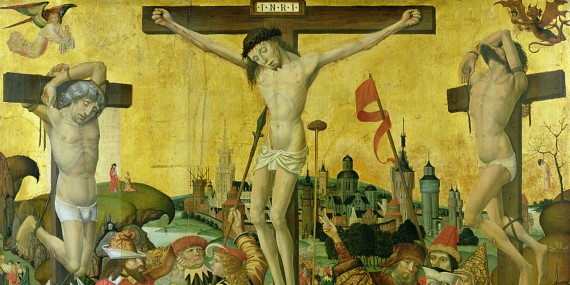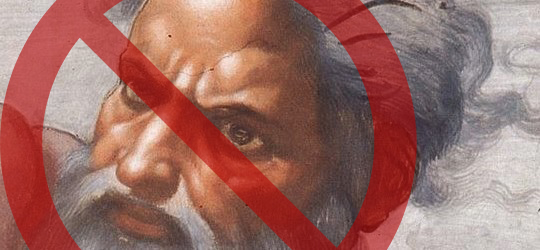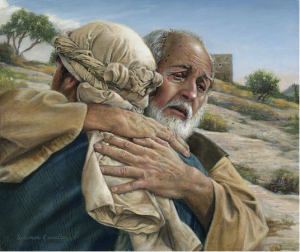
One of the truths about ourselves that we learn from Jesus is that the violent portrayals of God in the Old Testament are really the reflections of violence that resides in our own hearts.
Through Jesus, our depravity is laid bare and uncovered.
Through Jesus, the veil is pulled back, not just so that we can see God more clearly, but so that we can peer into our own hearts as well.
Just as the revelation of a loving Father is central to all of what Jesus said and did, so also, this truth about the violence that resides in the hearts of mankind also lurks beneath the surface in much of what Jesus teaches. Jesus came, not just to reveal God to us, but to show us our own hearts as well.
If I had lived in the days of Jesus…
Most of us Christians believe that if we had lived in the time of Jesus, we would have been one of His disciples.
Realistically, however, it is much more likely that we would have been numbered among those who called for His death. If we had been in Israel during the ministry of Jesus, it is quite likely that we would have killed Him too.
…I would have killed Jesus
Maybe I will just speak for myself: If I had been in Israel during the ministry of Jesus, it is quite likely that I would have been among those calling for the death of Jesus.
I can only say this because Jesus said it first.

He didn’t say it to me, but He said to the people of His day, which means that if I had been living at that time, He would have spoken to me as well. In all likelihood, if He appeared today, He would say much the same thing. What is it that He said? In Matthew 23:34-36 Jesus tells the Jewish people that they murdered all the prophets, wise men, and scribes whom God had sent. From Abel to Zechariah, the blood was on their hands (cf. Luke 11:50-51).
Clearly, the people alive at the time of Jesus had not actually committed these murders. But Jesus is telling them that their actions and behavior reveal the same mindset and perspective which led their ancestors to kill those whom God had sent. It was this same mindset and perspective that would lead these very people to kill Jesus.
And it is this exact same mindset and perspective today which leads Christians today to call for the death of others.
What is this mindset and perspective which pervades human history?
It is the mindset that some people must be killed because God commands it. It is the perspective which says that because of something someone does, they are under the judgment of God, and must therefore be killed.
The mindset and perspective which killed all the prophets, wise men, and scribes from Abel to Zachariah (and everybody in between), is the same mindset and perspective which killed Jesus, and the same mindset and perspective by which we call for the death of people today. It is the mindset which blames our own violence tendencies on God by saying that our enemies deserve to die, that God has commanded their death.
We “fail to understand that in the murder of the Prophets people refused to acknowledge their own violence and cast it off from themselves” (Girard, Things Hidden Since the Foundation of the World, 159-160), which is exactly what the people did when they crucified Jesus, and exactly what we do today when we seek violence against anyone else.
We Use Violence Against Those who Call Us to Account for our Violence
We do not wish to see that the reason we seek violence toward others is not because God wants us to kill or destroy them, but because these others have called us to account for the violence we ourselves have committed.
We engage in violence to cover up the violence we have already committed. If someone calls us to account for our violence, we deny their accusations by calling for their death, and in the process, attach God’s name to our violence to help us justify it further. This is the terrible truth of the tragic lie which has existed from the very beginning. “People do not wish to know that the whole human culture is based on the mythic process of conjuring away man’s violence by endlessly projecting it upon new victims” (Girard, Things Hidden Since the Foundation of the World, 164).
Religion Uses Violence in God’s Name to Cover Up our Own Violence
It gets even worse in religious circles, because religion loves nothing more than to use violence to disavow human violence, and when we lash out against others in violent ways, we lay the blame on God for our violent behavior.
All of this is why I say that if I had lived in the days of Jesus, I probably would have been among those calling for His death.
Why? Because Jesus had the audacity to point out that violence comes not from God, but from our own evil hearts.
This is too much for us to bear. This is too much for me to bear.
“We have the Scriptures!” I would cry. “We have the truth! The violence we perform in the name of God is because God has commanded us to commit the violence! It is not we who want to kill people, but God! And anybody who challenges the actions and behavior of God is clearly under the judgment of God, and must therefore die!”
These are the sorts of accusations the Jewish forefathers used to condemn to death the prophets, wise men, and scribes, and the same sort of accusations the Jewish people used to condemn Jesus to death, and the same sort of accusations we Christians use today to condemn others to death. And if you say we would not fall into the same trap as they did, then we have fallen into the same trap, for they said the same thing about their forefathers.
The simple act of condemning those who went before us for their violent actions is in itself the violent mindset that Jesus is trying to point out to us. The sin of feeling morally superior to others is the sin that leads us to do violence in the name of God toward others (Girard, I See Satan Fall Like Lightning, 20).
So when we feel morally superior to our forefathers, this reveals the same mindset that condemns contemporary people to death out of a sense of moral superiority to them.
We are violent and we justify our violence by attaching God’s name and God’s cause to our violence. But if Jesus tells us anything about God and about ourselves, the time has come for us to recognize that violence comes not from God, but from ourselves.
We are the murderers and the liars, and although God has willingly taken the blame and borne the responsibility for our actions, He is now, in Jesus Christ, calling us to recognize what is in our own hearts.
God Wants to Rescue us From Ourselves
We are the violent ones, and God wants to rescue and redeem us from ourselves.
As it happens, when we ask about God’s role in violence, later revelation in Scripture makes it pretty clear that God’s only activity was to rescue us from our own violence, redeem us from the consequences of violence, and reconcile us to Himself and to one another from the schisms caused by violence. The early church understood this quite well. Look at this sampling of quotes from the book of Acts:
… Him … you have taken by lawless hands, have crucified, and put to death; whom God raised up … (Acts 2:23-24).
… [you] killed the prince of Life, whom God raised from the dead … (Acts 3:15).
… Jesus Christ of Nazareth, whom you crucified, whom God raised from the dead … (Acts 4:10).
The God of our fathers raised up Jesus whom you murdered … (Acts 5:30).
… whom they killed by hanging on a tree, Him God raised up on the third day … (Acts 10:39-40).
Do you see? This small representation of verses shows a pattern which was revealed in Jesus Christ.
We humans are the violent ones; God is the one who rescues, redeems, restores, reconciles, and reverses the violence we commit, even when it is committed in His name.
 How can a God who says "Love your enemies" (Matthew 5:44) be the same God who instructs His people in the Old Testament to kill their enemies?
How can a God who says "Love your enemies" (Matthew 5:44) be the same God who instructs His people in the Old Testament to kill their enemies?
These are the sorts of questions we discuss and (try to) answer in my online discipleship group. Members of the group can also take ALL of my online courses (Valued at over $1000) at no charge. Learn more here: Join the RedeemingGod.com Discipleship Group I can't wait to hear what you have to say, and how we can help you better understand God and learn to live like Him in this world!




 One of the reasons Jesus came was to reveal God to us.
One of the reasons Jesus came was to reveal God to us.

 When the son returns, the father has clearly been watching for his return, for when the son is still a long way off, the father sees him coming, and runs to meet him on the road. For a wealthy middle-eastern man, any sort of running was considered shameful, but to run to meet a son who had betrayed you was extremely shameful. Nevertheless, due to the father’s great love for his son, he runs to meet him, and not only that, but gives him a warm welcome and throws a party for him.
When the son returns, the father has clearly been watching for his return, for when the son is still a long way off, the father sees him coming, and runs to meet him on the road. For a wealthy middle-eastern man, any sort of running was considered shameful, but to run to meet a son who had betrayed you was extremely shameful. Nevertheless, due to the father’s great love for his son, he runs to meet him, and not only that, but gives him a warm welcome and throws a party for him.
 Some people wonder why Jesus came when He did. Why not earlier … or later? I have
Some people wonder why Jesus came when He did. Why not earlier … or later? I have 

 This interpretation of the cross makes God once again the violent perpetrator of this most violent of crimes. According to this view, God ordained the death of His Son because God demands the blood sacrifice of an innocent victim to appease His anger toward sin.
This interpretation of the cross makes God once again the violent perpetrator of this most violent of crimes. According to this view, God ordained the death of His Son because God demands the blood sacrifice of an innocent victim to appease His anger toward sin. On the cross, Jesus removed the veil from the power of sin.
On the cross, Jesus removed the veil from the power of sin.
 In
In  Up until the crucifixion of Jesus, and even in the minds of most today, humanity believed the essential lie of the devil, that if someone was attacking you, you attack back. If someone was threatening you, you strike first and strike hard.
Up until the crucifixion of Jesus, and even in the minds of most today, humanity believed the essential lie of the devil, that if someone was attacking you, you attack back. If someone was threatening you, you strike first and strike hard.